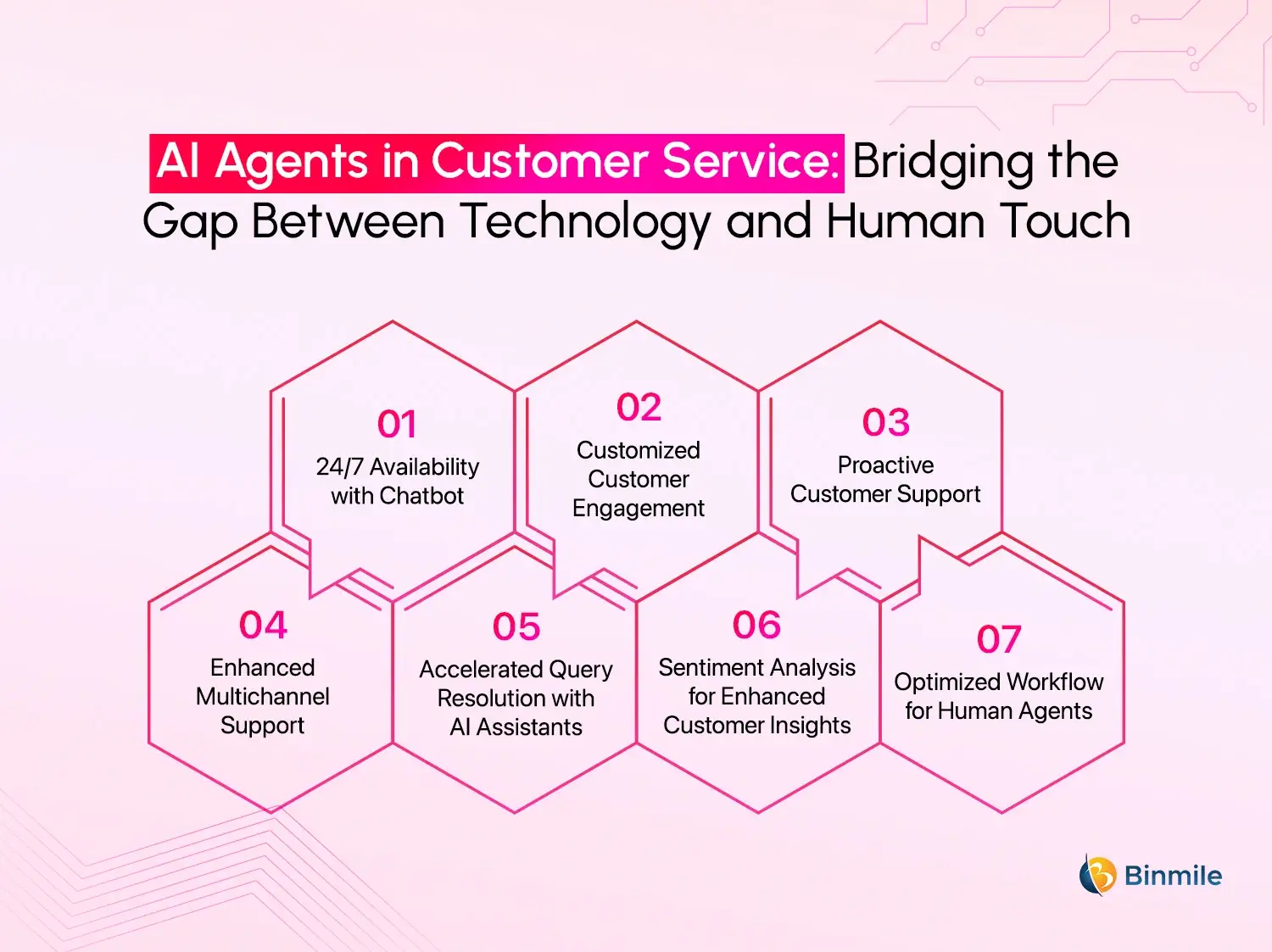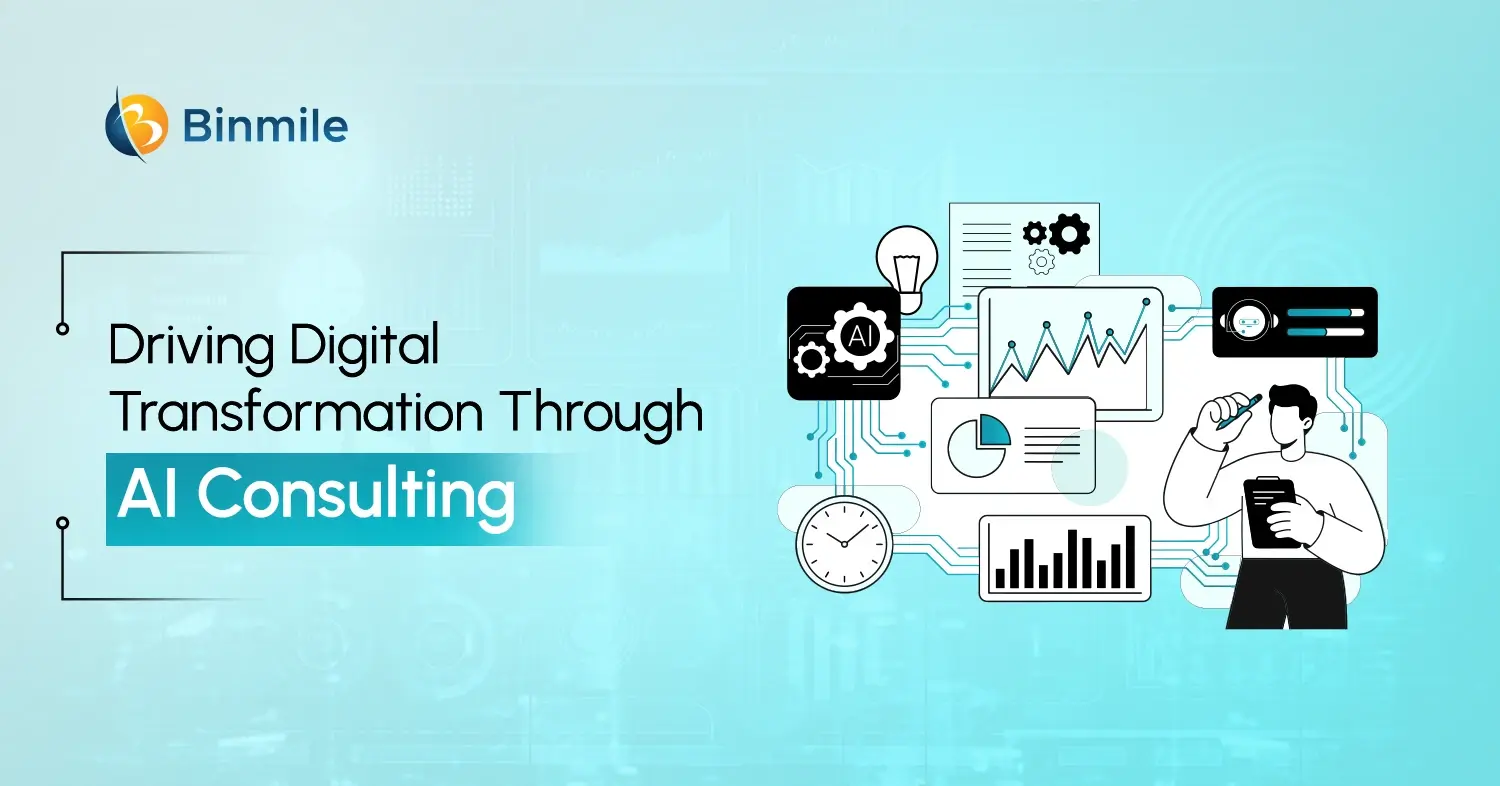The emergence of Artificial intelligence customer service is redefining how businesses connect with customers. From gaining insights into customers to identifying trends and patterns by analyzing vast amounts of customer data, AI in customer service enables companies to anticipate customer needs and targeted services and create highly personalized engagement to understand better and serve their customers. Additionally, organizations can do more with less in customer service. How? With AI customer service agents. Customer experience with AI offers the fastest and most effective route for them to deliver personalized, proactive experiences that drive customer engagement.
What is AI for customer service? It involves utilizing intelligent technology to deliver support experiences that are quick, efficient, and tailored to individual needs. Therefore, organizations must embrace these innovative solutions that are not only about staying ahead of the curve but also meeting the evolving demands of modern customers who expect faster response times and better experiences. This blog will discuss how AI customer service agents have transformed businesses to deliver solutions and provide customer engagement. In addition, we will also discuss a few steps on how you can implement AI in customer service in five quick steps.
Exploring the Impact of AI in Customer Service: 7 Key Insights to Know
AI in customer services is one of the most innovative AI business trends in recent years. It has also emerged as a pivotal driver, altering how businesses engage with customers and deliver support. Here are seven ways in which AI is transforming customer service and providing contemporary solutions:

1: 24/7 Availability with Chatbot
AI-powered chatbots are available around the clock, offering instant responses to customer inquiries. They handle repetitive tasks like addressing common questions, processing orders, and helping users troubleshoot. Advanced AI assistants can also engage in conversations that mimic human interactions, making communication more interactive and user-friendly. It ensures customers receive quick assistance without delays, boosting satisfaction and loyalty.
2: Customized Customer Engagement
AI leverages advanced data analysis to understand individual customer preferences and behaviors. By examining previous interactions, purchase history, browsing habits, and demographic information, AI enables businesses to present personalized suggestions, customized solutions, and relevant promotions. For example, an AI agent might recommend items based on a customer’s latest purchases or send reminders for restocking products. This level of customization cultivates closer relationships and improves the overall customer experience.
3: Proactive Customer Support
With its capabilities to analyze historical data and identify trends, AI can anticipate potential challenges and offer solutions before they arise. For example, AI might detect when a product requires maintenance or predict a customer’s need for service renewal. This allows businesses to send timely notifications or provide proactive assistance, minimizing the risk of problems worsening and improving customer satisfaction. Moreover, predictive support helps organizations proactively enhance resource management and respond to customer demands.
4: Enhanced Multichannel Support
Today’s customers communicate with companies via various channels, including social media, email, live chat, mobile applications, and phone calls. AI-powered systems integrate these channels, ensuring coherent and effective communication across all platforms. For instance, if a customer initiates a discussion on social media and continues it through email, AI can maintain the conversation’s context. Such omnichannel support enables businesses to provide smooth experiences and guarantees that no customer inquiry goes unattended.
5: Accelerated Query Resolution with AI Assistants
AI-powered tools like virtual assistants and Natural Language Processing (NLP) systems can swiftly process and analyze customer questions. They understand complex inquiries, discern the underlying intent, and respond accurately. AI systems can also direct customers to the most appropriate human agent for more complicated concerns while providing the agent with necessary background information. Thus, they reduce waiting times, reduce frustration, and enhance efficiency, resulting in a better customer and agent experience.
6: Sentiment Analysis for Enhanced Customer Insights
Artificial intelligence customer service offers AI-driven sentiment analysis tools to observe and assess customer emotions during interactions. These tools can ascertain whether a customer feels satisfied, frustrated, or confused by analyzing text, vocal tone, and facial expressions (in video conferencing). This understanding enables businesses to adapt their communication tactics in real-time. For instance, if a customer seems upset, AI can flag the interaction for immediate handling by a senior agent. Moreover, sentiment analysis aids businesses in identifying recurring issues and implementing long-term enhancements to boost customer satisfaction.
7: Optimized Workflow for Human Agents
AI does not replace human agents; it enhances their capabilities. By automating routine tasks like ticket classification, data entry, and order tracking, Artificial intelligence allows customer care agents to concentrate on more complex and sensitive issues requiring a human connection. AI also equips agents with real-time insights, including suggested replies or customer history, allowing them to address inquiries effectively. This optimized workflow increases productivity and guarantees customers top-notch support, ultimately fostering customer loyalty.
Leverage AI as a service to enhance your operations, increase efficiency, automate processes, and drive innovation across your organization.

The Future of AI in Customer Service: Challenges & Opportunities
We have seen a few examples of AI in customer service and how it transforms customer service and enhances customer satisfaction. Therefore, customer service is about to take a massive leap forward, thanks to emerging trends brought up by AI and its subsets, especially generative AI. With 63% of service professionals admitting that AI will help them serve their customers faster, it is imperative to understand how this will happen and its scope. So, let’s explore the future of AI in customer services and how we expect it to redefine how businesses offer solutions. AI agents are skilled at providing customer service representatives with the training to tackle specific issues. They can also use generative AI to look into other potential risks in the real world.
Moreover, companies rely on the ongoing use of AI-driven call scripts and workflows, which often need adjustments. This ensures that customer service staff have up-to-date information to handle customer complaints. At the same time, AI chatbots can leverage NLP to understand multiple languages and offer more personal and targeted experiences to customers of different nationalities or regions. With these abilities, AI agents in customer services can now manage most questions independently.
However, fully adopting AI in customer services presents specific challenges. The primary one is the skill gap. Since AI is still a new technology, the team lacks the skills to handle it. So, whenever you introduce the technology, explain how AI will help your teams get more done and that their human skills are still very much needed to provide an excellent customer experience. Concerns related to privacy and trust should be taken seriously. Remember, when the data for AI is grounded in your trusted CRM data, following the highest standards for compliance and data security, you can overcome any challenge.
What are the Benefits of AI in Customer Service: An Insider Look

- Enhanced productivity: AI tools like Einstein Copilot or ZenDesk help service teams work faster by integrating with their regular work processes. Regarding customer service, 84% of IT leaders agree that AI will improve work, making their support agents 14% more efficient.
- Improved Efficiency: When customer agents perform routine tasks manually, they may struggle with them and make many mistakes. However, AI systems mitigate these issues by offering agents automated guidance from company databases and customer details, which helps them respond to customers faster and more accurately.
- Tailored Service Interaction: AI systems work better when viewing and using the company’s data. The automated system pulls customer information for ongoing chats and sends it to field staff, making it easier for them to give each customer a more personalized support experience.
- Streamlined Operations: AI can analyze customer service interactions such as emails, calls, or in-app messages to determine the signs that a customer will likely escalate an issue and offer timely resolutions. It helps provide better service and prevent conflicts by automatically showing customers helpful articles before they get upset.
- Proactive Service Experience: AI analyzes customer details, such as subscription plan updates or maintenance notifications, to guide agents in taking the best actions with customers—even after the service engagement.
5 Steps to Implement AI in Customer Services
Here are quick and practical steps to get started with AI for customer service:
- Choose the right AI tools: Once you assess your business needs, research and evaluate AI tools based on integration capabilities, scalability, and user reviews.
- Develop a plan: Create a plan with timelines, budget, and resources. Outline steps for AI integration, considering potential disruptions.
- Integrate AI with existing solutions: Ensure AI tools work with current systems through API integrations and technical configurations. Conduct pilot tests.
- Train your team: Provide training on using AI tools effectively. You can offer ongoing support and encouraging feedback for quick AI adoption.
- Monitor and optimize: It’s crucial to track the performance of your AI systems, including response times, customer satisfaction scores, and resolution rates. This will provide key insights and feedback and help you understand how these tools impact the support experience.
Create intelligent, high-performance AI apps and software solutions that enhance customer experience & build more innovative, efficient operations.

Closing Statement
Undoubtedly, artificial intelligence in customer service has reshaped the world of customer service. However, organizations must not forget a crucial stakeholder: humans. So, once they blend the synergy of human and AI agents in customer services, you can effectively leverage AI to provide the most seamless experiences possible. Therefore, as AI in customer services continues to evolve, its role in customer engagement and interaction will expand. It can also go beyond offering even more innovative and efficient solutions and augment the entire process.
However, before investing in AI-driven customer service solutions, you must also understand how to utilize the technology effectively and create meaningful customer connections. The possibilities are endless, from voice recognition systems that understand multiple languages and dialects to advanced self-service portals with interactive AI-driven tutorials. Therefore, if you wish to leverage AI-enhanced capabilities, our AI development solutions can help you create a more responsive, efficient, and data-driven support experience that meets the changing needs of customers and support teams.









